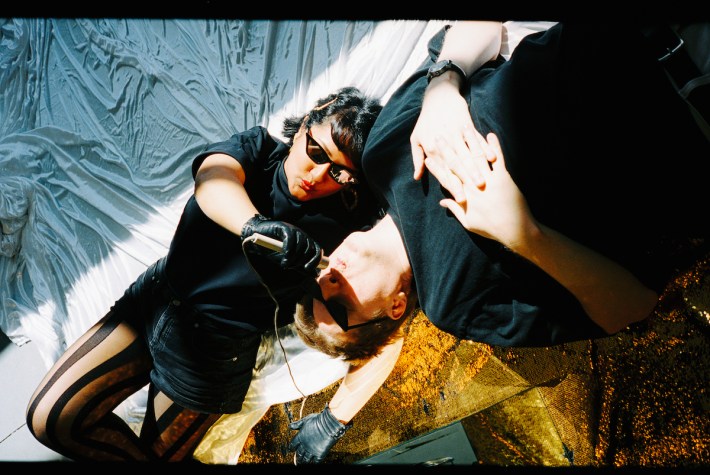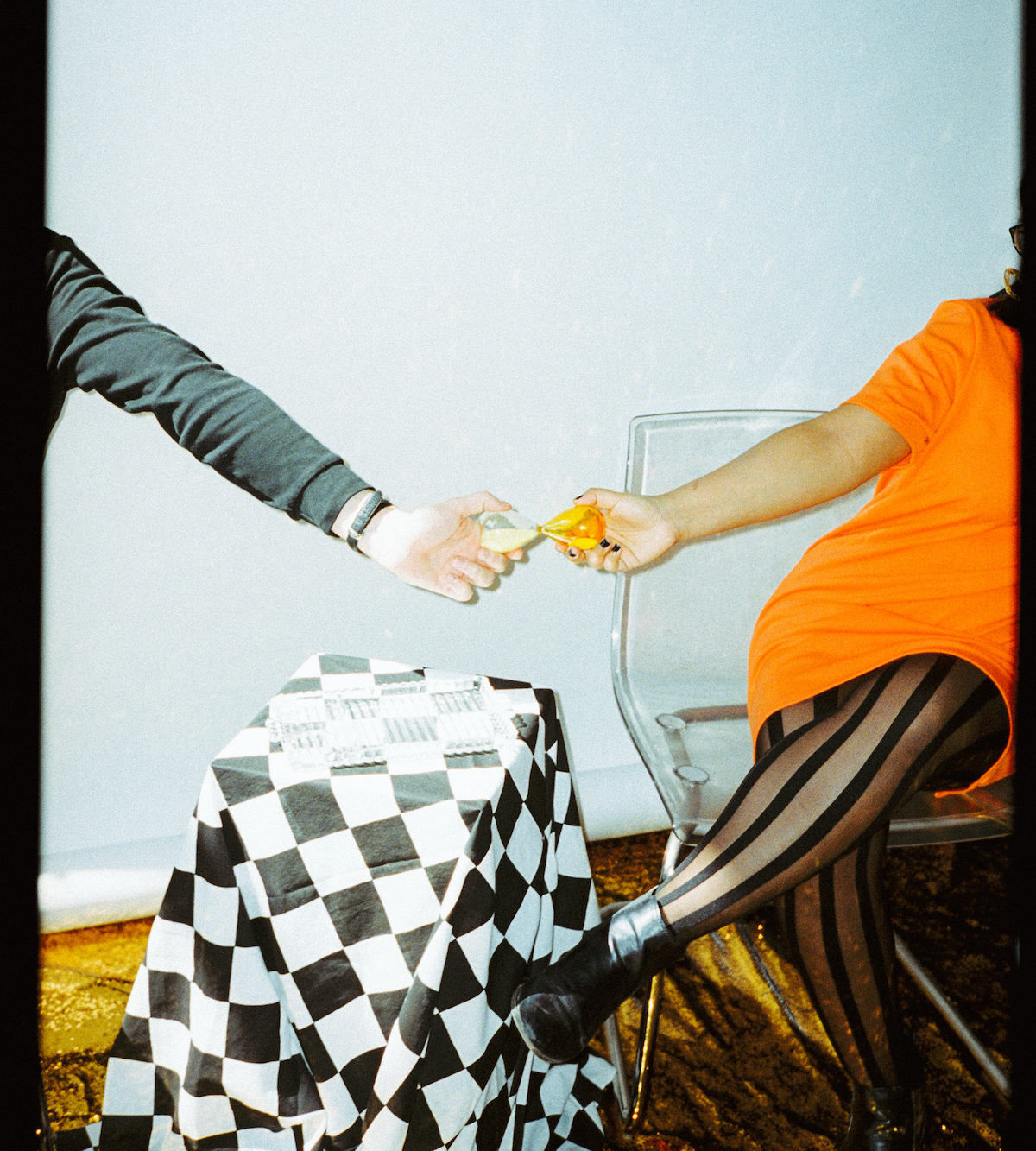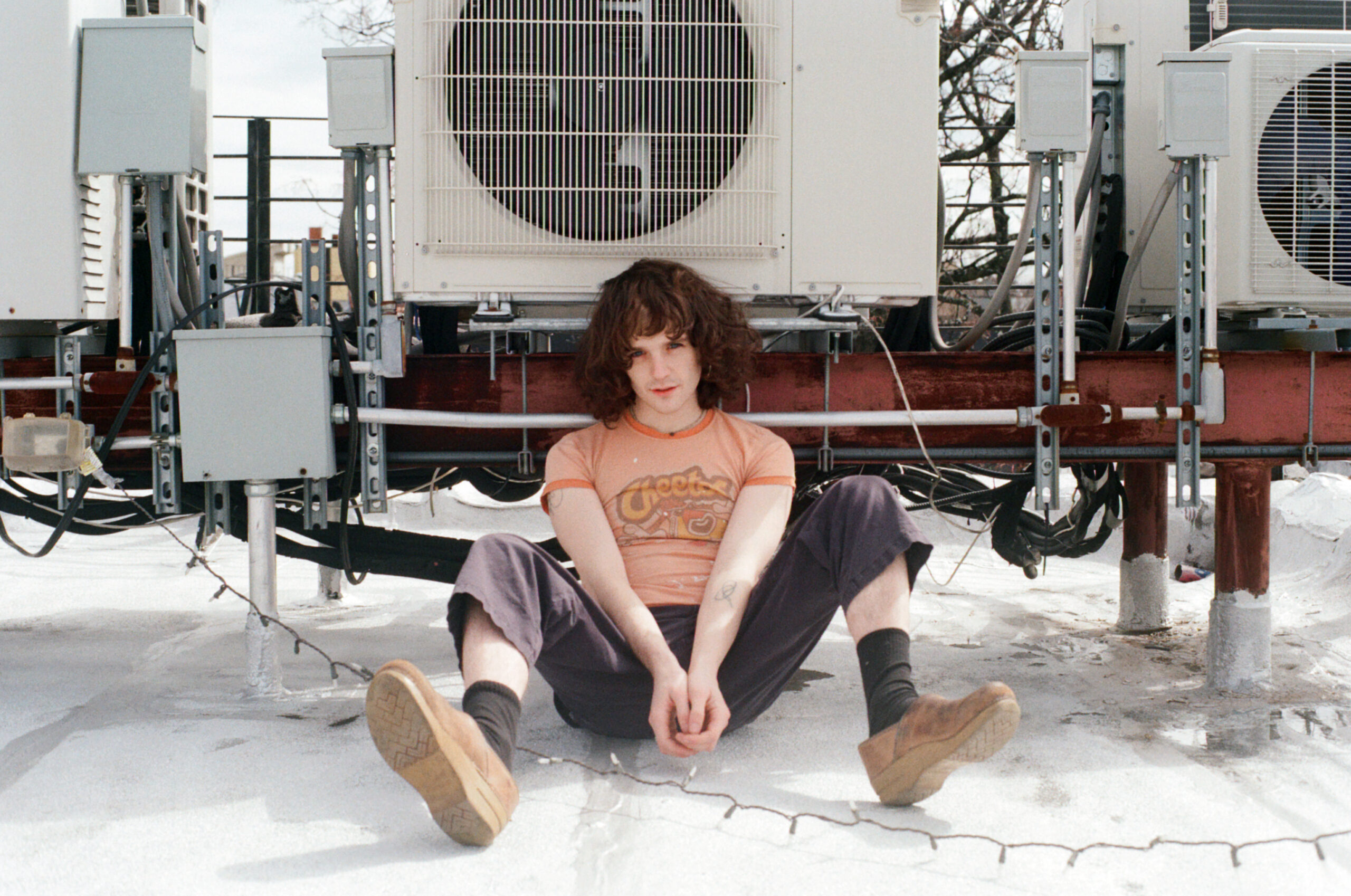Sweeping Promises sound like a shareholder presentation gone off the rails: enunciated but enormous, brief but brash. The songs on the band’s 2020 debut Hunger For A Way Out echo that corporate discomfort, emotions conveyed via investor-speak: “My words on your paper/ You’ll cross me out,” vocalist and bassist Lira Mondal sings on “Cross Me Out,” reducing betrayal to a pesky line item. Their sound rattles with reverb; compact basslines play off of surf-rock riffs, chipper analog synthesizers, and Mondal’s expansive vocal range. Against a terrain of post-punk revivalists, Sweeping Promises resemble the genuine article, combining the operatics of X-Ray Spex’s Poly Styrene with the campy professionalism of Blondie and Devo. "We sound very buttoned up, don't we?" guitarist Caufield Schnug observed. "Well, I do have my top buttoned up," Mondal pointed out.
The duo's economical approach to songwriting -- fitting 10 songs into 27 minutes -- reflects their self-imposed constraints. They'll usually ditch a song if it's not "80% there in 20 minutes," Schnug explained. "Even if there's really good ideas, if it doesn't feel like a cohesive whole we're just like, 'Let's just start a new one,'" Mondal added. To these two, creativity works best with constraints. "There are rules," Schnug said. Mondal elaborated: "Or else, there’s just chaos."
But these are relatively minor self-imposed restrictions for the members of Sweeping Promises, who have been playing in bands together for over a decade. The two met in undergrad at Hendrix College in Arkansas, Mondal's home state. Schnug grew up playing in punk bands around his native Austin; Mondal was introduced to music by her family at an early age and is a classically trained vocalist. In their previous groups, they’ve taken an almost dogmatic approach to pop, with rules like "only one or two cymbal crashes per song" or a ban on the word "baby" in lyrics.
Mondal and Schnug start new bands with the same spontaneity that others might try a new haircut. They don’t have an exact count, but there are at least half a dozen groups in their past: There's the icy precision of darkwavers Dee-Parts, Silkies' giddy garage rock, the glittering post-punk of Blau Blau, and Splitting Image's angular riffs. Their most well-known group prior to Sweeping Promises is Mini Dresses, a verdant dream-pop group that made local waves in Boston, their longtime home base. The projects vary in execution but share a gritty aesthetic, perhaps owed to Schnug's recording techniques as one-half of the mastering team Melody Men, which favor mono to stereo and analog equipment to DAWs. And while they weren’t planning on revisiting their former bands, there’s already a new one in the works. "I've always wanted to have a PowerPoint presentation as a show," Schnug said, an idea that might "find a way in a side project soon to be coming to you."

Still, there were some natural limits placed on Sweeping Promises' debut: Schnug and Mondal recorded the record in a converted laboratory at Harvard, where Schnug is a "late stage" PhD candidate. ("Academia feeds the Virgo beast," he added by way of explanation.) The 40-foot ceilings meant that their songs had to be intentional: "The capacious architecture and the reverb that results from [that space] forces you to play sparsely, because everything that you play resounds monumentally," Schnug explained. "I think a lot of the minimalism of the songwriting is due in large part to not wanting to oversaturate," Mondal added. "Or have too many ideas that cancel each other out vibrationally."
Recorded with a single-mic technique, their songs feel perfectly lived in: The buoyant bass on "Safer Now" and "Blue" buzzes with a palpable liveness while still resounding with a crisp remove. And then there’s Mondal's voice, halfway between Cindy Wilson's disaffected bark and lush "wall of sound" girl group harmonies. Her louder, bolder vocals came from realizing that she could just write "the parts of songs that I always loved singing really loud at the top of my lungs in the cars" for herself. But it's a taxing performance: "The first thing I thought of when we were in Chicago is, 'Boy, I hope my voice teacher doesn't show up because she would hate what I'm doing with my voice,'" Mondal added. Still, she relies on vocal warmups and breath techniques before live shows to help with vocal endurance.
During the pandemic, they temporarily moved in with Schnug's parents in Austin, where they recorded their newest single "Pain Without A Touch," released domestically on Feel It Records and on Sub Pop in the rest of the world. In a rare exception to their 20-minute rule, the song's combination of restless lyrics and jaunty guitar melodies came from revisiting an abandoned songwriting effort. It was one of "30 or 40" songs they’d written in the past year; returning to it months later, the band realized it could work with new lyrics. They sat down and recorded it, stream-of-consciously, in Schnug's bathroom, isolated from the rest of the sounds in the family home. There are nine other yet-to-be-released songs from what they’ve dubbed the "Bathroom Sessions," but Schnug insists "that will not be the [second] album."
The songs that comprise the next LP, they say, will be recordings from "non-toilet-encompassing rooms." Schnug and Mondal recently relocated to Lawrence, Kansas, after nearly buying a church in Ohio. Their new home is almost tailor-made for a band that thrives off self-recording: a house with an attached studio. "It's all wood floors, high ceilings, tons of reverb," Mondal said. "It kind of sounds like the space that we had in Cambridge." But even now, with a proper recording space, it doesn't seem likely that they'll ditch their straightforward audio preferences. "There’s a directness in our ability to write with each other that we really can't afford to capture any less spontaneously," Mondal explained. To them, recording in mono and capturing sounds with minimal equipment is a conscious effort to make an active choice based on the material realities of indie musicians -- to "try to regain some sort of control in the face of a really uncontrollable life situation for everyone who isn't in the 1%," Mondal said. "There's this sort of central idea of oneness," she added. "We're just standing up in the face of noise or reverb."







